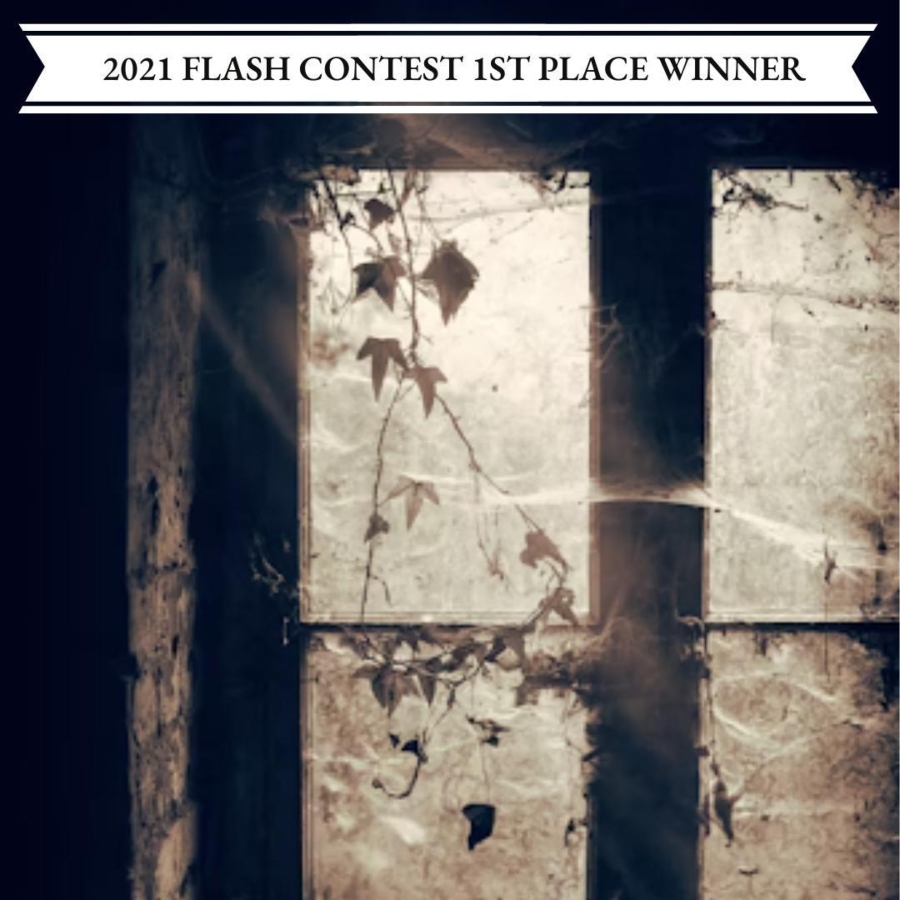The ghosts have come looking for my maid, but the maid is not here. The maid is out back in the alley with crusts of bread and apricot pits and chicken bones. The maid looked hard at me when I put her outside. Her eyes black and round as new moons. My whole body crackles with the unfairness of it. We have kept her alive. Doesn’t that count? They say we shouldn’t be feeding her, and still, we feed her. They say she is dangerous and they are right. Our maid can subsist on anything. She eats lamb in large bites, her mouth open, bloody clumps falling out. She picks her teeth with the splinters of the boat that washed up on the mountain. She slurps up our grandparents, and the soapy aftertaste doesn’t bother her, or the fuzz on their chins. The maid eats our words before we can hear ourselves speak. She eats entire olive trees, the bark and leaves included. How can this be forgiven? She begs with her eyes, so loud we all must cover our ears, and still her hunger echoes, echoes, echoes.
The maid is a poison and ever since we took her in, we have all been getting sicker. We crawl from our beds to the kitchen, we search the cupboards for medicine, we read the numbers on her wrist for aftercare instructions. There is no medicine, the maid says, not with her voice, but with the ghosts whistling through the hole in her cheek. There are no instructions. Her face looks crowded, even though all of its parts are so small. My husband has not risen from bed in ten days. A film of ash covers him. The maid doesn’t fetch the duster, doesn’t wet a cloth, doesn’t even wipe his forehead with her thumb. Not much of a maid, my neighbor says, dripping locusts, as she sips the coffee I have made for us, and when my neighbor leaves, the maid gathers the locusts from the rug, from the chair, from inside the coffee cups. She stores them in a jar and places it on a shelf with the other plagues, each one of them labeled.
The maid is seven years old, but this isn’t why she is no good at cleaning. She is no good at cleaning because what’s the point when everything will just keep getting dirty? The maid has other uses. She applies ointment to the blister on my heel and she uncoils my son from around my pinched lungs and she kneads life back into me. I refuse to love her. The maid eats our words and we are all shouting at each other from inches away, frantic to be heard.
You are nothing like my mother, the maid tells me.
But her mother is dead. Her mother died in a tent in the desert and the maid woke up and someone dragged her away, and this is when she bit the hole through her cheek. I know this about her the same way she knows about my blistered heel, and the scales on my son’s belly, and the daughters I had before she came to us. My daughters were beautiful. They fell from my hair when I combed it, like dandruff. I sheared off all my hair in grief but it was too late. Now the maid sits on the rug with the ghosts of my daughters and teaches them games: with apricot pits, with snail shells, with ducks they have stolen from the pond and ponds they have stolen from somewhere far away. They flip the ducks, read the numbers on their slick bottom feathers, gather their prizes, and let the ducks go. When the maid smiles, the hole in her cheek rattles. Sometimes I think I could love her. But my son is a snake and my husband is a heap of ash and my other children don’t know how to eat raw lamb or olive bark or the souls of their grandparents, they can only eat bread. This is another reason they will die.
They will die, the maid echoes, with harvest moon eyes.
So I drag her through the house, I put her out in the alley, and I’m not sorry. The maid is shaking all over. What does she have to be afraid of? The dogs won’t kill her, and neither will the hunger because there are still her children’s children’s children to contend with—there is still the fairground with the plastic ducks, each of them numbered. Blinking lights, a pool with scalloped edges. Someday her children will assault each other with the story of us—how we took her in, saved her life, starved her, turned her into Cinderella, how their mother’s hands shook when she told them about the dogs in the alley—a maid and a nanny at age seven, can you imagine?
In the morning I will go out to fetch my maid, and she will look hard at me, and the blister on my heel will begin to bleed.
You are nothing like my mother, she tells me, with waning crescent eyes.
I am nothing like your mother, I agree. She is crying. We are both crying. I want to hold her to my breast and bury my face in her long, unshorn hair. I want to tell her that everything will be okay, that it will end. That everything will be okay in the end. But soon she will move on from us, and the ghosts of my daughters will stop coming, and the only thing I’ll have left is an altar of feathers and snail shells and apricot pits. I step over my son’s coiled body. I lay down on my husband’s ashes. I dream of my maid, the hole in her cheek. I curl up inside it and sleep.

